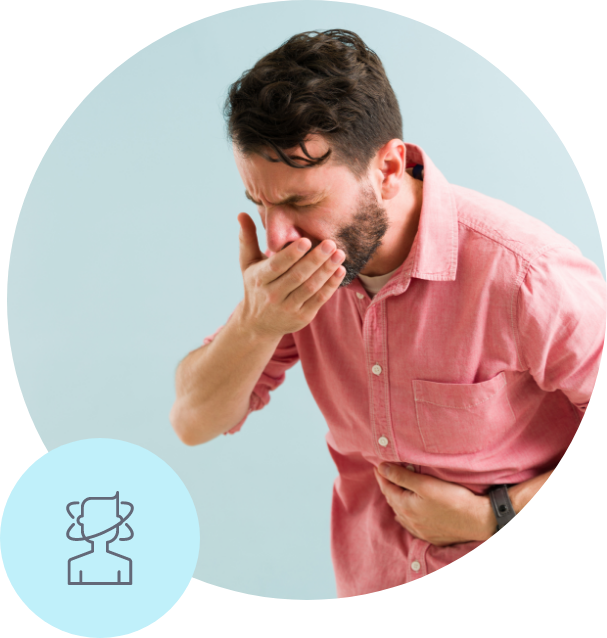Nausea and Vomiting
Even though Covid primarily affects the upper respiratory system, many patients experience symptoms that affect their digestive systems as well. Have you noticed gastrology issues since your Covid illness? You might be recovered from the virus at this point but still experiencing ongoing symptoms such as digestive issues.
Our experienced medical team is here to help you get to the root of your long-haul Covid symptoms. We specialize in post-Covid treatments with the goal of helping patients return to their pre-Covid lifestyle as much as possible. However, some people have ongoing symptoms that never seem to go away, which is why it’s critical to meet with a specialist if you still have these symptoms.

Symptoms of Post-Covid Gastrological Problems
An estimated one-third of Covid patients present with gastrointestinal problems. Many people find that these symptoms clear up after recovering from the virus. But long-haul symptoms can continue to affect the digestive system and might include:
- Nausea
- Diarrhea
- Vomiting
- Loss of appetite
- Gastroenteritis
- Aversion to taste
- Bleeding in the GI tract
- Abdominal discomfort
Mild GI symptoms might be a minor inconvenience in your daily activities. But severe GI symptoms can cause significant disruption to a person’s lifestyle, making it hard to get through the day.
Each patient is unique, which is why the symptoms differ from one person to the next. In addition, researchers are still trying to understand how and why the virus impairs the stomach or intestinal lining, causing different types of stomach diseases after Covid.
Treatments for Nausea and Vomiting After Covid
Since this virus is relatively new, providers are still researching how it affects the body and the most effective ways to treat associated symptoms. We don’t have clear answers about the underlying cause of GI issues post-Covid. But there are treatment options to manage the symptoms and help you find relief.
Possible treatments for nausea, vomiting, and other gastrointestinal issues after Covid might include:
- Over-the-Counter or Prescription Medication: Mild or moderate GI symptoms can be managed with over-the-counter medication. Choose products designed for the specific symptoms you are experiencing, such as bismuth (Pepto-Bismol), loperamide (Imodium), metoclopramide (Reglan), or ondansetron (Zofran). If over-the-counter medications aren’t sufficient, you might need a prescription from your provider.
- Hydration: Even though it’s hard to drink fluids when you aren’t feeling well, hydration is essential to maintain overall wellness. Try sipping on a soda or water. IV hydration might be necessary in severe cases of dehydration due to nausea or vomiting.
If GI symptoms are persistent after a Covid infection, then it’s time to see a specialist for diagnosis and treatment. Testing and evaluation can help us uncover the underlying issues with a variety of treatments for these symptoms.